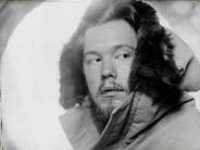"My first record was more of a spiritual quest - about God, and right and wrong. This new album is about how I'm feeling, it's more introspective, but at the same time it's about other people. It's about longing for freedom, escape -- and people."
So says VAST's Jon Crosby. With that in mind, it's only appropriate that the new VAST album is entitled Music For People. In sound and scope, Music For People is a great expansion of the identity forged with VAST's acclaimed debut disc, Visual Audio Sensory Theater. It's everything one could hope for in a second album from this young artist - songs that are at once powerful and delicate, haunting and reassuring, epic and intimate. And it rocks with authority when it needs to, with heavy guitars and sinewy grooves.
Crosby's bleak yet exhilarating songs are a reflection of his upbringing in rural America. He grew up in Humboldt County, California, in a town of 7,000 people. As far as music is concerned, he says, "It was MTV or nothing." Jon credits the film Amadeus as igniting his desire to be a musician -- a classical musician. Then, as he recalls, "I met this girl named Michelle and I decided I wanted to learn how to play the Beatles' 'Michelle.' It had just enough to diminished chords -- similar to classical music -- for me to get into rock. And I became a huge Beatles fan."
As he grew older, his tastes moved towards alternative bands like U2, Depeche Mode and The Cure. After he moved to San Francisco, he joined a guitar workshop and passed a demo tape to the president of Shrapnel Records, earning him a profile in Guitar Player magazine when he was only thirteen. Crosby eventually quit public school to do home study and work more on his music. A punk girl from L.A. introduced him to more raucous influences like the Sex Pistols, and his contrarian streak was off and running. With the alternative and grunge scenes booming in the media, and the punk and ska scene happening in the streets, Crosby, at the age of 16, began delving into electronic music, calling his group VAST. His first break occurred a few years later when a local radio station began playing a VAST demo tape on a regular basis. After that, Crosby shopped another tape around New York. Several labels pursued him, and he signed with Elektra.
Visual Audio Sensory Theater, released in April 1998, was a stunning debut. With its richly orchestrated, haunting, darkly textured music (performed entirely by Crosby), open-to-interpretation lyrics and Jon's deep, lamenting vocals, there was nothing else like it on the radio.
The album spawned two alternative radio hits - "Touched" and "Pretty When You Cry" - and earned volumes of critical praise. Fans include Metallica drummer Lars Ulrich, who called VAST "one of the best debut albums I've heard in a long, long time. It hits you on so many levels. It's been a record I've been listening to over and over." Jon and his band -- drummer Steve Clark and bassist Thomas Froggrett -- continued their experience together from the road into the studio and since have added Justin Cotter, a guitarist from Australia.
When it came time to record the new album, "I wanted some new challenges," Jon explains. "After co-producing four songs on the first record, I felt it was time to try to produce the whole thing. I had a vision for sound and feel of this record. I wanted to do something fresh, but without leaning on electronics. In the '60s, bands tried different things sonically, but the results were always real and natural. That influenced the way we recorded and the instruments we picked. We used hammer dulcimer, there's harpsichord, flute, trombone, organ. Instruments like this haven't been used with computers as far as I know.
"In the studio, I wanted to do things differently," he continues. "I opened the doors a little more, so as not to repeat myself. In particular, this album was recorded more as a band, with Thomas and Steve playing in the studio. So even though I wrote all the songs and most of the parts, the sessions were more social. There were more sounding boards, more voices. Having other people play brings something more to the finished product."
Also different was the way the orchestrations were recorded. "Andrew Mackay, one of the biggest classical arrangers in England, had worked with the New Bombay Recording Orchestra," explains Jon, "and we felt that they would be a good choice for the album. So we traveled to Mumbai, India to record their parts. It was an amazing learning experience. Then we had Alan Moulder mix the record in London. I just felt very humble to be with such talented people working with my music.
"I spent a lot of time on the lyrics for this album," he says. "I listened to my favorite bands, to see what they do that I might do better. Artists like Leonard Cohen, Talking Heads, U2, Bob Dylan - they have a certain sophistication and subtlety with lyrics. I think it's funny how producers and A&R people usually don't comment on lyrics. They mainly think about melodies, grooves and arrangements. But critics and fans do pay attention. It matters to me. There are so many cool things you can do, and I want to explore that."
He continues, "I've learned a lot about myself. When you perform, you see what connects to the audience, but you also see what connects for yourself. It helps you to get a better sense of who you are."
Source: http://www.elektra.com/
